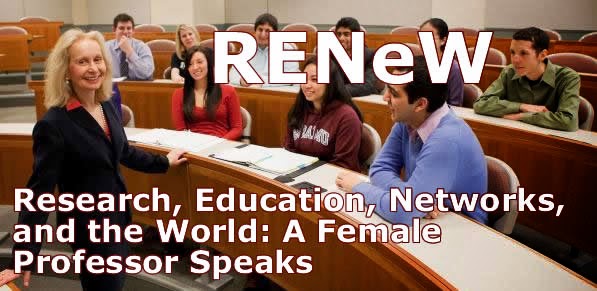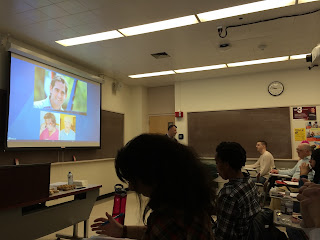Today we had the great honor of hosting Dr. Mahmoud Hariri, who is a Scholars at Risk Fellow at Harvard University, as a guest speaker in my Humanitarian Logistics and Healthcare class.
His guest lecture on the Syrian Crisis had been scheduled for March 7, but, since he had gotten into a course at the Macy Institute at Harvard, he asked for a postponement, and I graciously agreed. It was worth waiting for him!
There were logistics involved even in terms of getting him to speak to my class, which meets on Tuesdays and Thursdays at 8:30AM at the Isenberg School of Management. Since he is now at Harvard University for a few months, before returning to his home country of Syria, I arranged for a 6:15AM pickup in eastern Massachusetts and he arrived at the Isenberg School at 8:15AM! Last night he had been busy speaking on a panel at Harvard and meeting with Syrian doctors until midnight.
Dr. Hariri has to be one of the bravest people I have ever met and, in teaching this course and working on disaster relief and operations research, I have communicated and interacted with many courageous and outstanding scholars and practitioners in this field.
He began his presentation by providing us with an overview of the Syrian Crisis and illustrated his presentation with numerous personal experiences. As a trauma surgeon, he has had to work in (and is now even helping to construct) makeshift hospitals, has driven an ambulance (these are usually covered in mud to camouflage), and has seen healthcare facilities targeted with bombs, especially using a double bomb attack tactic.
He shared with us conditions in prison that are so horrific I will spare you the details, but even children are imprisoned for "crimes" allegedly committed by a parent, which could even involve giving medical care to a patient.
Elderly parents are not spared.
He stated that high school students have three options, once they graduate:
1. become a refugee
2. carry arms and become a militant
3. continue one's education, if feasible.
Through incredible creativity and the novel use of technology he is working on educating medical students in Syria, most of whom will not be trained doing dissections, but will work directly on patients, many suffering from war wounds due to bombs and other weapons.
One hospital that he has worked at was targeted 25 times. The health system in Syria has almost collapsed with more than 50% of those working in hospitals now volunteers.
For security, they have moved hospitals underground and emergency rooms are sometimes located separately from hospitals to reduce the chance of detection and strikes. Dr. Hariri, has, at times, had to operate on patients, who are blindfolded, so that they don't recognize him in the community as a doctor, since medical professionals are targeted.
His creativity, drive to do good and help, have resulted in such innovations as having 5 ICUs being monitored from the US, medical education via smart phone, and with students studying on smart phones. He emphasized the importance of learning English among students in Syria and that even a warehouse of books was destroyed by the regime. Many of the books had been provided by the Dutch. 2 and a half million children in Syria are not in formal schools and mothers are trying to home school children.
Some of the bombs that are being dropped are in the form of toys.
There are now 5,000 Syrian doctors in the US but fewer than 2,000 in Syria.
To show you how dire the situation is, when speaking to militants, he was told that they did not want a hospital located in their area, since it was too dangerous! What a challenge for operations research and applications of location theory!
Dr. Hariri believes that education is essential and will be pivotal in changing the crisis in Syria, a country in which dozens of weapons have been used in experiments.
His presentation, on Prezi, can be viewed here.
The love for his country, his brilliance, ingenuity, dedication, energy, and passion for doing what is right shone throughout his presentation today.
Below is a photo taken after his lecture. I presented him with a plaque for being a Professor for a Day and also a gift from the Isenberg School.
Afterwards, several students lingered to ask him more questions.
Many thanks to a humanitarian hero - Dr. Mahmoud Hariri, for a lecture that noone in the audience will ever forget.
For a nice article on Dr. Hariri in the Harvard Gazette, click here.
About Me
- Dr. Anna Nagurney
- Dr. Anna Nagurney is the Eugene M. Isenberg Chair in Integrative Studies at the Isenberg School of Management at the University of Massachusetts Amherst. She was appointed to this chaired professorship on April 14, 2021. Prior to this chaired professorship, since 1998, she was the John F. Smith Memorial Professor of Operations Management. She was a Visiting Fellow at All Souls College at Oxford University for the 2016 Trinity term. She was a Visiting Professor at the School of Business, Economics and Law at the University of Gothenburg in Sweden for 2012, 2013, 2014, and 2015. Her latest book is: Labor and Supply Chain Networks, published by Springer in 2023. Her other recent book, co-edited with I. Kotsireas, P.M. Pardalos, and A. Tsokas, is: Dynamics of Disasters: Impact, Risk, Resilience, and Solutions, and was published by Springer in 2021. She is also the co-author of the book: Competing on Supply Chain Quality: A Network Economics Perspective, with D. Li, and published in 2016. She is the Founding Director of the Virtual Center for Supernetworks, which she established in 2001.
Subscribe To RENeW


Recent Visitors
Blog Archive
-
▼
2017
(67)
-
▼
March
(6)
- Fabulous Talk by Professor Ozlem Ergun on Restorat...
- Isenberg School of Management PhD Students and Fac...
- The Syrian Crisis and a Humanitarian Hero - Dr. Ma...
- Game Theory and Fresh Produce Supply Chains - It's...
- Opportunities for Doctoral Students to Speak at Re...
- Decision-Making Under Deep Uncertainty With Applic...
-
▼
March
(6)






















